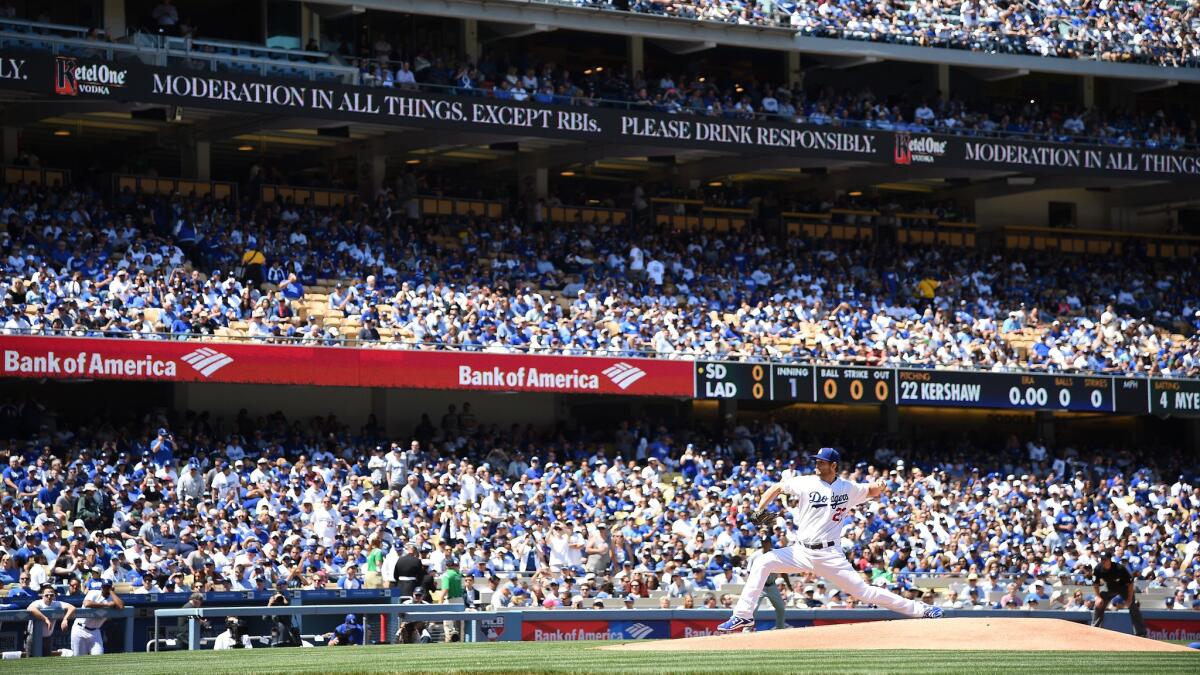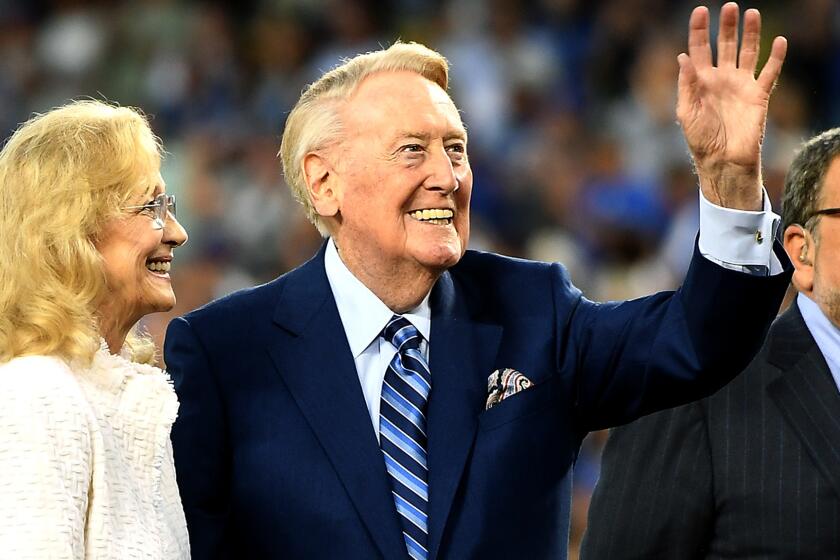Dodgers TV blackout ends. But for Kershaw’s peak and Scully’s finale, you had to be there, L.A.

- Share via
Amid greed that has been so improbable, the impossible has happened.
The Dodgers TV blackout has been lifted.
After six years of the Dodgers allowing more than half of Los Angeles to sit in the dark, Spectrum Networks has reached an agreement to carry SportsNet LA on AT&T video platforms that include DirecTV, AT&T TV, U-Verse TV and AT&T Now.
When and if games return this summer, folks throughout the city will finally be able to watch the Dodgers without pirating a signal.
“Hallelujah!” read one Wednesday morning text message from a fan who suddenly had the Dodger station at her fingertips. Truly, this is worth celebrating.
But it is impossible to rejoice without also recognizing the scars of the most damaging monetary feud in this city’s sports history, a battle pitting the Dodgers billions against the wishes of local folks who just wanted to watch their favorite team.
It is irresponsible to ignore the smoking wreckage left behind, namely the legacy of a Dodger ownership group that could have avoided this mess long ago with one stroke of a pen.
He spent the last three years as a symbol of what has become the biggest Dodgers ownership blunder in franchise history.
The blackout occurred after the Dodgers signed a record 25-year, $8.35 billion television deal with Time Warner Cable in 2013. In an effort to recoup its huge investment, TWC and later Charter Communications charged the sort of carriage fee that DirecTV and later AT&T would not pay.
The Dodgers could have reworked the deal to make it more cable friendly, but would not. Ownership was criticized continually for this inaction over the past six years, but would never relent. Los Angeles mayor Eric Garcetti refused to get involved. Baseball commissioner Rob Manfred wouldn’t even nudge the Dodgers. Many fans endured six summers of TV screens without the Dodgers until the team suddenly appeared during the playoffs.
Various economic issues finally pulled the deal together, including AT&T’s desire to have Charter carry its new video-on-demand streaming service, HBO Max.
Even though the financial crisis surrounding the pandemic was not a leading factor in this, the specter of upcoming games being played in empty stadiums makes it a great time to buy into the lucrative sports TV business. If formerly shunned Dodger fans are wary of returning to early-season Dodger games, they now have a place to watch them.
Legendary Dodgers announcer Vin Scully says the coronavirus outbreak is unlike anything he’s ever seen, but he finds hope in a time of despair.
There are many reasons to applaud what has been instantly gained by millions. As many will soon learn, the SportsNet LA production value is high, Joe Davis and Orel Hershiser have great chemistry in the booth, and Alanna Rizzo asks all the right questions on the field and in the clubhouse.
But there are as many reasons for remorse over the blackout’s cost.
The final years of Vin Scully, lost. The golden age of Clayton Kershaw, lost. Six summers of division-championship baseball, lost.
The lack of local TV exposure hurt the Dodgers in All-Star game voting — fans increasingly stopped voting for players they couldn’t see. A last-minute voting marathon organized by the Dodgers was required to give Justin Turner his rightful spot in the 2017 game.
A similar lack of buzz surrounded players who made their debuts during the blackout. Despite hitting 35 homers in each of the last two seasons, Max Muncy remains one of baseball’s underappreciated stars because many hometown fans rarely saw him play.
The blackout also hurt the Dodgers’ local popularity. Even though they annually lead the league in attendance, and have been easily Los Angeles’ most consistent winners for those six years, they remain a clear second to the Lakers in terms of attention.
For all the many good things accomplished by Guggenheim Baseball Management since buying the team in the spring of 2012 — refurbishing the stadium, hiring Andrew Friedman as president of baseball operations, seven consecutive West Division titles, two World Series appearances — their resumé has been stained by some of their most loyal fans not being able to watch them on television.
The blackout became so enduring, it outlived folks whom it affected most.
In 2015, I wrote a column on Jim Ballard, a 94-year-old World War II veteran from Carpinteria whose life was centered on watching the Dodgers every night on television … until the blackout robbed him of his greatest pleasure.
“It’s like my team just forgot all about me,” he said at the time.
In 2018, I wrote another column on Ballard. He died of a massive stroke at age 97. He died still longing for the summer night when the Dodgers would return to his TV screen.
“My grandfather could never understand why he couldn’t just turn on the TV and the Dodgers would appear,” said John McCoy, his grandson and caregiver. “There’s so much money involved, why do the Dodgers have to do this to their fans?”
On Wednesday, the fans finally triumphed. It happened six years too late amid circumstances that were far too avoidable, but a win is a win. Hallelujah indeed.
More to Read
Are you a true-blue fan?
Get our Dodgers Dugout newsletter for insights, news and much more.
You may occasionally receive promotional content from the Los Angeles Times.












